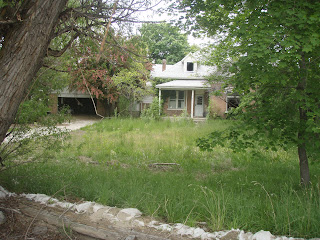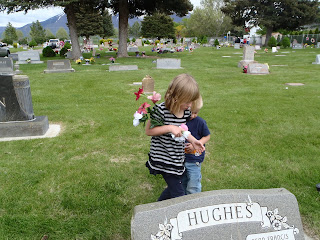www.harktheherald.com May 10, 2011
Karen Ellingson got a couple of surprises when she found out she was pregnant with her second child.
One surprise was her third child.
The other was how healthy her second pregnancy was, even though she was pregnant with twins, which typically see more problems than single births.
"For whatever reason, my cravings were for things like vegetables and strawberries, whereas my first baby, it was like, give me a Big Mac and french fries or I will die," the Springville woman said.
Ellingson's twins didn't come early, as twins are prone to do; she actually was induced at 40 weeks and two days, which is about as full as a full-term pregnancy can be. She was never on bed rest; she said she walked consistently throughout her pregnancy.
She could be the poster mother for the results of a study from a University of Utah professor that found mothers of twins tend to live longer than mothers who only give birth to single babies.
It's not that having twins makes you healthier, family and consumer sciences professor Ken Smith said. It's that healthy women are more likely to naturally conceive twins and then continue to be healthy.
"Whatever the mystery ingredient is, that's what's leading to the association between twinning and longevity," he said.
Smith looked at almost 60,000 Utah mothers born in the 1800s, during a period without modern birth control or in vitro fertilization, who lived to at least 50 years old. About 4,600 of those women gave birth to twins, which is one of the largest samples available. Twin moms averaged about a 5 percent lower chance of dying each year after age 50 than single-birth mothers.
The significance today is that something made those women healthier and more robust, and it's possible that something is still floating around in Utah families.
"If it's this innate healthiness that is what the mother of that twin had, that's the ingredient that we're kind of circling around, that could be and probably is being passed on to her descendants," he said.
The study does not extrapolate toward women who have undergone fertility treatments. It also didn't take into account those mothers who died young; the researchers looked at those who made it past menopause.
The good news is, most mothers did make it past 50 years old, and from there those who gave birth to twins had an edge on moms of singles.
In some ways that seems counter intuitive, since having a newborn is stressful and having two newborns increases that stress exponentially. Smith admitted he was surprised, especially since these pioneer women were likely to see their longevity decrease as the number of children they bore increased.
"That was probably the most stressful time of my entire life because I was so sleep deprived," Ellingson said. "There's always somebody who needs you."
Springville resident Janette Weakley, a mother of 3-year-old twin girls, found the conclusions interesting, although not exactly surprising. She spent the last couple of weeks of her pregnancy in bed, and the twins came five weeks early, but mother and babies were fine. Weakley said she actually recovered more quickly after that pregnancy than the two before it or the one after it.
Part of that, she suspects, is in addition to two newborns she had two toddlers to chase. But she also started running sooner. She also, however, considers herself fairly healthy; she runs frequently, which both serves to keep her fit and helps to relieve pent-up frustration, and she and her family eat healthy foods.
But she also could see a correlation between wrestling twins and longevity.
"It's definitely a lot of work, and I believe hard work can you make live longer," Weakley said.
She's 31 -- "who knows if I'm really going to live longer?" -- but said she constantly talks to people when she takes the twins out who have a twin or know twins or are related to twins; she's intrigued by the variety of people who experience double birth.
Smith would like to look into whether this trend is still continuing, but the numbers are much harder to see today than they were 100 years ago. He suspects the natural robustness and the tendency toward twinning is there, but the rate of women having twins has dropped as fewer women have children and those who do don't have seven, eight or in one woman's case, 22 live births.
It certainly poses a number of questions about life span and health, he said.
"People age different, people survive at different ages and there's lots of variation," Smith said. "What are the contributing factors?"

.jpg)
















